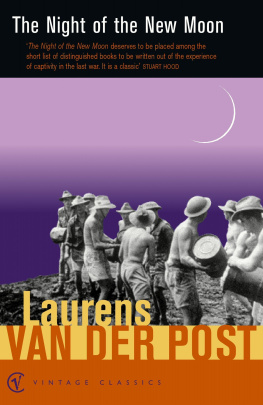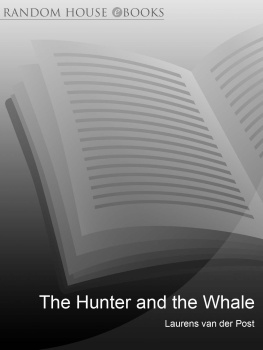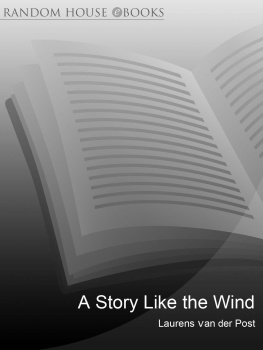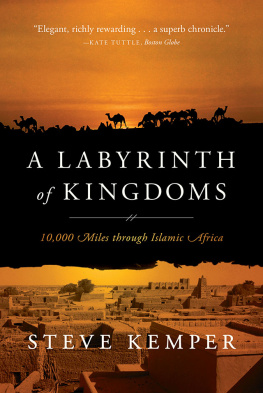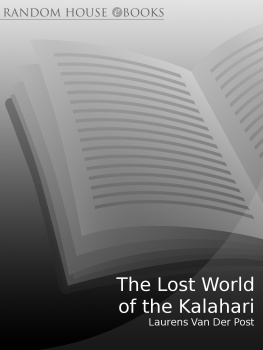VENTURE TO THEINTERIORLaurens van der PostV I N T A G E
This eBook is copyright material and must not be copied, reproduced, transferred, distributed, leased, licensed or publicly performed or used in any way except as specifically permitted in writing by the publishers, as allowed under the terms and conditions under which it was purchased or as strictly permitted by applicable copyright law. Any unauthorised distribution or use of this text may be a direct infringement of the authors and publishers rights and those responsible may be liable in law accordingly.
Epub ISBN: 9781407073217
Version 1.0
www.randomhouse.co.uk
Published by Vintage 2002
1 3 5 7 9 10 8 6 4 2
Copyright Laurens van der Post 1952
This book is sold subject to the condition that it shall not,
by way of trade or otherwise, be lent, resold, hired out, or
otherwise circulated without the publishers prior consent in
any form of binding or cover other than that in which it is
published and without a similar condition including this
condition being imposed on the subsequent purchaser
First published in Great Britain by Chatto & Windus 1986
Vintage
Random House, 20 Vauxhall Bridge Road,
London SW1V 2SA
Random House Australia (Pty) Limited
20 Alfred Street, Milsons Point, Sydney,
New South Wales 2061, Australia
Random House New Zealand Limited
18 Poland Road, Glenfield,
Auckland 10, New Zealand
Random House (Pty) Limited
Endulini, 5a Jubilee Road, Parktown 2193, South Africa
The Random House Group Limited Reg. No. 954009
www.randomhouse.co.uk
A CIP catalogue record for this book
is available from the British Library
ISBN 0 09 942873 3
Papers used by Random House are natural, recyclable
products made from wood grown in sustainable forests.
The manufacturing processes conform to the environmental
regulations of the country of origin.
Printed and bound in Great Britain by
Cox & Wyman Ltd, Reading, Berkshire
About the Author
Laurens van der Post was born in South Africa in 1906, the thirteenth of fifteen children in a family of Dutch and French Huguenot origins. Most of his adult life was spent with one foot in Africa and one in England. His professions of writer and farmer were interrupted by ten years of soldiering in the British Army, serving with distinction in the Western Desert, Abyssinia, Burma and the Far East. Taken prisoner by the Japanese, he was held in captivity for three years before returning to active service as a member of Lord Mountbattens staff in Indonesia and, later, as Military Attach to the British Minister in Java.
After 1949 he undertook several official missions exploring little-known parts of Africa, and his journey in search of the Bushmen in 1957 formed the basis of his famous documentary film and The Lost World of the Kalahari. Other television films include All Africa Within Us and The Story of Carl Gustav Jung, whom he met after the war and grew to know as a personal friend. In 1934 he wrote In a Province, the first book by a South African to expose the horrors of racism. Other books include Venture to the Interior (1952), The Heart of the Hunter (1961), and A Walk with a White Bushman (1986). The Seed and the Sower was made into a film under the title Merry Christmas, Mr Lawrence, and, more recently, A Story Like the Wind and A Far-Off Place were combined and made into the film A Far-Off Place.
Sir Laurens van der Post was awarded the CBE in 1947 and received his knighthood in 1981. He died in 1996.
ALSO BY LAURENS VAN DER POST
In a Province
The Face Beside the Fire
Flamingo Feather
The Dark Eye in Africa
The Lost World of the Kalahari
The Heart of the Hunter
The Seed and the Sower
Journey into Russia
The Hunter and the Whale
The Night of the New Moon
A Story like the Wind
A Far-Off Place
A Mantis Carol
Jung and the Story of our Time
First Catch your Eland
Yet Being Someone Other
A Walk with a White Bushman
About Blady: A Pattern Out of Time
The Voice of the Thunder
Feather Fall
For
INGARET GIFFARD
in order to defeat the latest
of many separations
I owe a great deal to Frances Cornford, Robert Chapman and my wife, Ingaret Giffard, for helping to prepare the manuscript of this book for publication
Footnotes
Chapter 1
Impi is the Zulu or Sindabele for an army or regiment. This force usually attacked in a formation shaped like a crescent moon: thin and light at the tips of the horns; deep and solid in the centre. The task of the horns was to spread out and surround the enemy; that of the centre constantly to reinforce its extreme flanks.
Alas! She only lived to be ninety because of her inability to spare herself, and that is another and greater story to write. [Footnote added 1986.]
Chapter 2
T. S. Eliot, Little Gidding.
Chapter 4
Fragment of a poem by the author.
Chapter 6
Apart from feelings arising out of a life-long friendship with William Plomer, I believe no one with any sense of the quintessential Africa can be unconscious of a very great debt to him. His was the first imagination to allow the black man of Africa to enter it in his own human right. Even the great and good Olive Schreiner saw the native primarily as a social and ethical problem. Plomer was the first to accept him without qualification or reservation as a human being. His stories of Africa are tremendously brave pioneer achievements and broke the first shackles in the European mind-forged manacles of Africa. Books like Alan Patons Cry, the Beloved Country or my own In a Province would not have been possible but for him.
Chapter 16
Donner, literally thunder, is the Afrikaans equivalent of the Australian Bastard. It can be either a term of great affection or extreme abuse. On this occasion, I do not think it was a term of affection.
Chapter 21
W. T. H. Nichols was a great camp Commander. In the last war I saw courage of all kinds but none quite of the Nichols quality. It was almost a matter of routine with him. All day and every day it was with him, as much a part of him as the colour of his eyes or the shape of his head. Neither that courage nor, what is rarer still, his imagination failed him or us in those long, grim, inarticulate years in Japanese prisons. When we were released I stayed behind in Java, but I happen to know that on return to England not one of our thousand odd British prisoners-of-war needed rehabilitationso unlike the prisoners returning from other theatres of war.
[Footnote added, 1986.] In my book The Night of the New Moon, which is dedicated to Nichols, I tried to make some acknowledgement of the debt that his country and fellow prisoners-of-war owe him. After the war he continued to serve in the R.A.F., became Group Captain and later Air Commodore, and has now retired after years of distinguished work at Fontainebleau and Brussels.
Chapter 21
Ian Horobin, Conservative Member of Parliament for Southwark, when war broke out abandoned politics for service in the R.A.F. After the capitulation of the Allied forces in Java he made an attempt to break away and join me in the hills of Bantam; but, as a result of this, he fell ill, was captured by the Japanese and imprisoned. Because he resolutely refused to answer the questions put to him about me and other matters, he was sorely beaten-up and ill-treated by his captors and was in a very poor state of health when I too was bundled into prison with him many months later. But his spirit was indomitable and we all brought away with us a generous store of the wise and witty sayings with which Horobin enlivened our days in jail.
Next page

